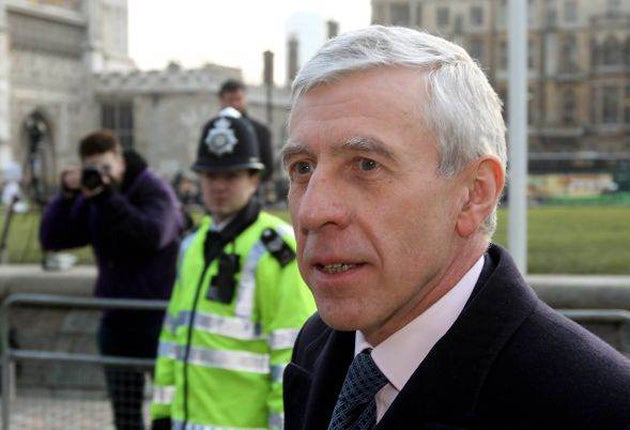Straw: Regime change in Iraq was off the agenda
Case for war depended on threat to security, testifies former foreign secretary

Your support helps us to tell the story
From reproductive rights to climate change to Big Tech, The Independent is on the ground when the story is developing. Whether it's investigating the financials of Elon Musk's pro-Trump PAC or producing our latest documentary, 'The A Word', which shines a light on the American women fighting for reproductive rights, we know how important it is to parse out the facts from the messaging.
At such a critical moment in US history, we need reporters on the ground. Your donation allows us to keep sending journalists to speak to both sides of the story.
The Independent is trusted by Americans across the entire political spectrum. And unlike many other quality news outlets, we choose not to lock Americans out of our reporting and analysis with paywalls. We believe quality journalism should be available to everyone, paid for by those who can afford it.
Your support makes all the difference.Jack Straw warned Tony Blair that regime change could never be justification for British troops invading Iraq and suggested alternatives just weeks before military action began, he has revealed.
The Justice Secretary also became the first serving Cabinet minister to express regret over the war, telling the Iraq inquiry that the decision to back the March 2003 invasion was "the most difficult I have ever faced in my life". He said the mistaken presentation of the claim that Saddam Hussein possessed weapons that could be launched with 45 minutes "has haunted" Labour ever since.
During his evidence yesterday, Mr Straw said that he had advised the former prime minister not to back the US policy of regime change for Iraq. He said he had told his own officials in the spring of 2002, a year before the invasion, that regime change was "off the agenda" as it would not have been legal.
"[Regime change] was off the agenda as far as the UK was concerned," Mr Straw said. "A foreign policy objective of regime change I regard as improper and also self-evidently unlawful. It had no chance of being a runner in the UK, it certainly would not have got my support. The case therefore stood or fell on whether Iraq posed a threat to international peace and security by reason of its weapons of mass destruction."
However, Mr Blair appeared to reveal last month that he backed a policy of regime change. Britain joined the US-led invasion on the premise that Saddam possessed weapons of mass destruction (WMD). But in a television interview, Mr Blair said he would "still have thought it right to remove" the former Iraqi leader even if he had not possessed WMD.
Revealing the divisions within the Cabinet before the war, Mr Straw, who was the Foreign Secretary at the time, hinted that he and Mr Blair had clashed over the issue. "It is no great surprise to know that people at senior levels in government hold different views and debate those," he said. "What I had to offer the prime minister was my best judgement and my loyalty."
While Mr Straw said he never considered resigning over the invasion, he would have left his post if Mr Blair had refused to have a vote in parliament on the decision to go to war. He added that he had privately raised concerns with both Gordon Brown and Geoff Hoon.
Questioned about the government's September 2002 dossier outlining Mr Blair's fears over Saddam, Mr Straw admitted mistakes were made over the 45-minute claim, which was only intended to refer to short-range, battlefield weapons. "That reference should have been much more precise," he said. "That is an error and it was an error that has haunted us ever since."
An apparent difference of opinion with Mr Blair also arose over a letter the former prime minster had sent to President George Bush in July 2002, in which he pledged Britain's support if military action became necessary. While Mr Straw said that although he was "mainly" happy with the letter, he added he would have written it differently. "Would I have written the memorandum in the same way? Probably not," he said. "I'm a different person."
He told the inquiry that he could have stopped Britain's participation in the Iraq invasion if he had withdrawn his support. "I was fully aware that my support for military action was critical," he said in a memo written to the inquiry team. "If I had refused that, the UK's participation in the military action would not in practice have been possible. There almost certainly would have been no majority in either Cabinet or in the Commons."
The failure to find WMD had "undermined trust", he said, but refused to say he would not make the same decision again. "I made my choice. I have never backed away from it, and I do not intend to do so, and fully accept the responsibilities which flow from that," he said. "I believed at the time, and still believe, that we made the best judgements we could have done in the circumstances. We did so assiduously, and on the best evidence we had available at the time."
He added that he "deeply regretted" the "grave loss of life" that had occurred as a result of the invasion. "We did not have the benefit of hindsight," he said.
Join our commenting forum
Join thought-provoking conversations, follow other Independent readers and see their replies
Comments